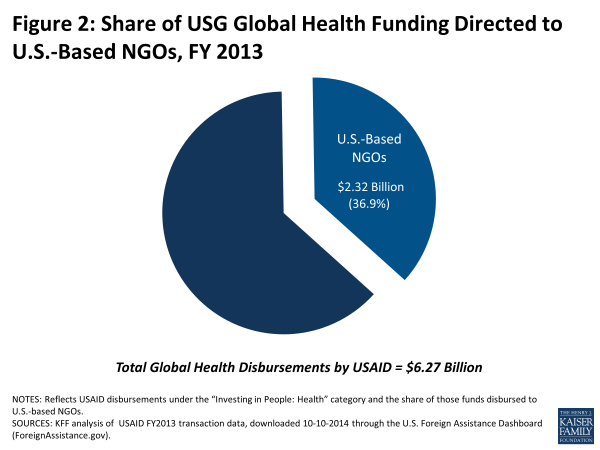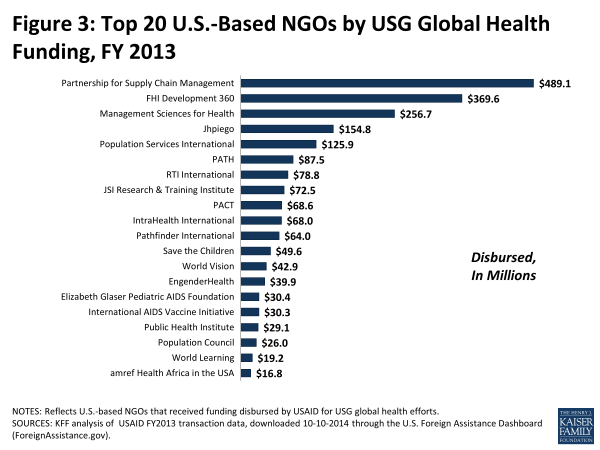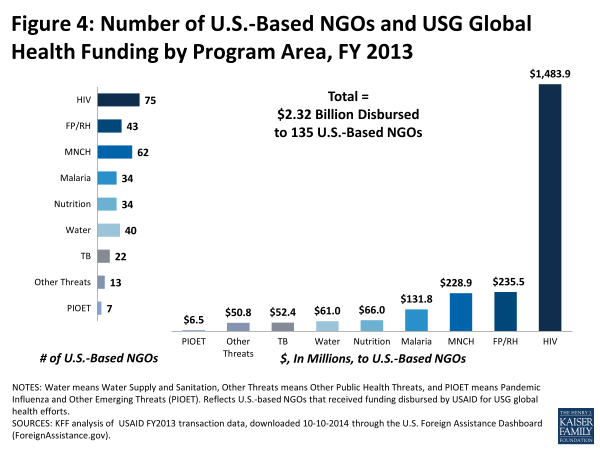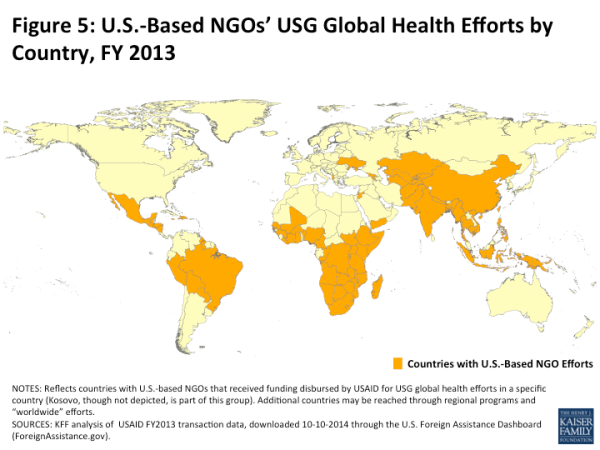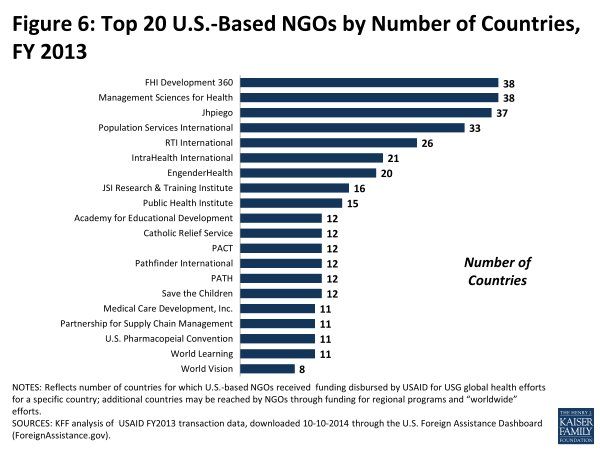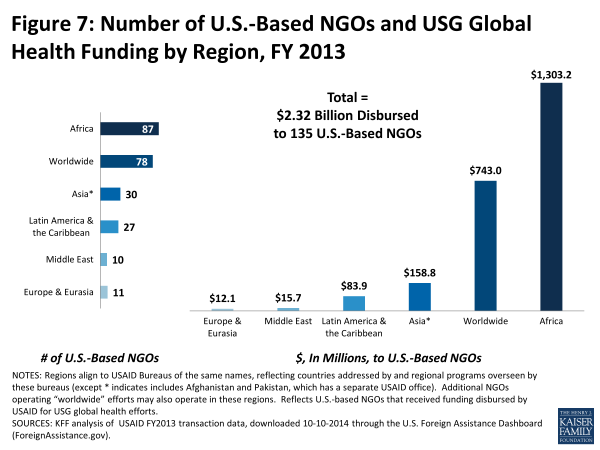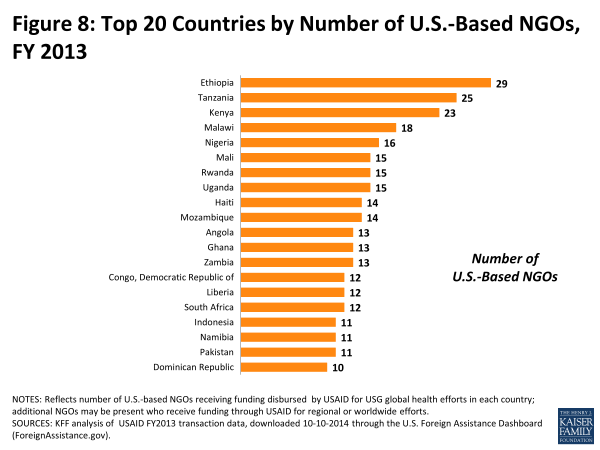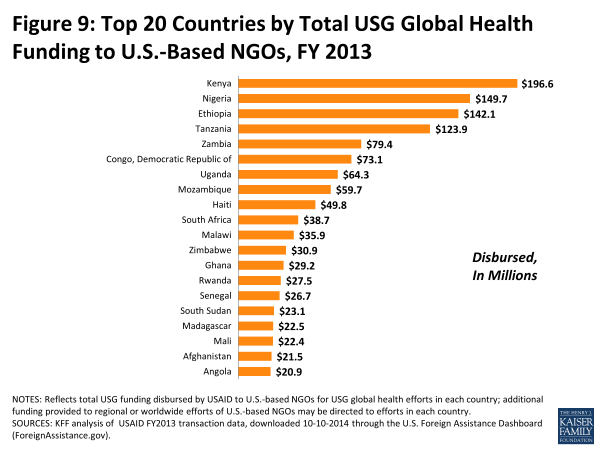NGO Engagement in U.S. Global Health Efforts: U.S.-Based NGOs Receiving USG Support Through USAID
Introduction
Non-governmental organizations (NGOs) are key partners in U.S. global health efforts. Indeed, a significant share of U.S. government funding for global health is channeled to NGOs, who act as program implementers on the ground. NGOs also play other roles in global health, including through advocacy, analysis, education and awareness-raising, and fundraising activities. To date, however, little information has been available about the extent of their role in carrying out U.S. global health programs.
To help fill this void, this report provides an analysis of U.S.-based NGOs that received global health funding from the U.S. government (USG) during FY 2013. Due to the parameters of the analysis as well as data limitations, this report focuses on USG funding that the U.S. Agency for International Development (USAID) received through direct appropriations as well as through interagency transfers (e.g., from the Department of State1), which together account for the majority of U.S. bilateral global health spending.2 Specifically, its findings are based on KFF analysis of data on funding disbursed by USAID in FY 2013 to U.S.-based non-profits implementing USG global health activities, which was downloaded from the U.S. government’s Foreign Assistance Dashboard (www.ForeignAssistance.gov); other sources of data included organizations’ websites, which were used to confirm organizations’ non-profit statuses as well as the U.S. locations of their headquarters/main U.S. offices implementing specific global health activities. (See Box 1 for the definition of U.S.-based NGOs utilized in the analysis and Appendix A for a detailed methodology.) In addition to identifying these NGOs, this report examines their funding levels, program areas, and geographic focus.
Box 1: Definition of Non-Governmental Organizations (NGOs)
For the purposes of this analysis, to be eligible to be included, an organization had to meet the following definition of a U.S.-based NGO: a non-profit that is independent of the U.S. government and any other government, based in the United States (through either its headquarters or a main U.S. office that had been awarded a USG global health project), and not a university/college, a hospital, or a foundation that solely supports a U.S. government department/agency, hospital, or university. Non-profits excluded under this definition include, for example, the CDC Foundation and the Pan American Health Organization. This definition was informed by the USAID definition of private voluntary organizations (PVOs),3 which guides a USAID registration process for NGOs.
By design, therefore, this report does not include an exhaustive examination of U.S.-based NGOs involved in carrying out USG-supported global health efforts (let alone U.S.-based NGOs carrying out global health efforts who do not receive USG support; see endnote4). It also does it include foreign-based NGOs, who also are significant implementers of USG programs.
Findings
Overview
More than 130 U.S.-based NGOs implement USG global health efforts. In FY 2013, 135 NGOs received USG funding from USAID to implement global health efforts (see Figure 1). They include NGOs working on specific global health issues (such as the Global Alliance for TB Drug Development and mWater), those working in multiple global health areas (such as CARE and Save the Children), and those with an even broader development scope (such as Innovations for Poverty Action). They include 20 faith-based NGOs (such as Samaritan’s Purse and World Vision).5
| Figure 1: U.S.-Based NGOs Implementing USG Global Health Efforts, FY 2013 | |||
|
|
|
|
| NOTES: Includes U.S.-based NGOs to which USAID disbursed USG global health funding in FY 2013. # indicates NGO is no longer operating. + indicates NGO included JSI Research & Training Institute, MSH, and AED. ~ indicates NGO is a separate legal entity established by JSI Research & Training Institute and MSH to implement specific work. SOURCES: KFF analysis of USAID FY2013 transaction data, downloaded 10-10-2014 through the U.S. Foreign Assistance Dashboard (ForeignAssistance.gov) as well as information from NGO websites. |
|||
Approximately $2.32 billion – or more than a third of USAID global health disbursements – was disbursed to U.S.-based NGOs in FY 2013. U.S.-based NGOs received $2,316,727,617 in FY 2013 for USG global health efforts, about 37% of total global health funding disbursed by USAID that year (see Figure 2). This funding was provided to U.S.-based NGOs through all of the functional and geographic bureaus at USAID, including the Bureau for Africa and the Bureau for Global Health.6
Most funding provided to NGOs was directed to a small number of organizations. Twenty NGOs accounted for the vast majority of funding (about 91% or $2.1 billion) (see Figure 3). Among these, 11 received more than more than $50 million in net disbursements each, collectively accounting for more than three-quarters of all funding (about 79% or $1.8 billion). These were the Partnership for Supply Chain Management, FHI Development 360, Management Sciences for Health (MSH), Jhpiego, Population Services International (PSI), PATH, RTI International, JSI Research & Training Institute, PACT, IntraHealth International, and Pathfinder International. On the other end of the funding range, 74 NGOs received less than $1 million each.
Program Areas
NGOs carry out USG global health efforts in all major U.S. program areas. NGOs are working in all nine program areas of the USG, including: HIV/AIDS; tuberculosis (TB); malaria; family planning/reproductive health (FP/RH); maternal, newborn, and child health (MNCH); nutrition; water supply and sanitation; pandemic influenza and other emerging threats (PIOET);7 and other public health threats, including neglected tropical diseases (NTDs).8
About half of NGOs receive funding in a single global health program area, while remaining NGOs receive funding to work in multiple program areas. In FY 2013, 68 NGOs received support for efforts related to a single program area, while 67 received support for efforts related to more than one program area, including 27 (20%) that received funding for efforts related to four or more areas.
The program area involving the greatest numbers of NGOs is HIV, followed by MNCH. As Figure 4 shows, 75 NGOs worked on HIV and 62 on MNCH efforts, followed by FP/RH (43), water supply and sanitation (40), malaria (34), nutrition (34), TB (22), and other public health threats (13). Only PIOET efforts involved less than ten NGOs, with 7 NGOs carrying out these efforts. The greatest proportion of funding to NGOs was for HIV efforts, followed by FP/RH and MNCH. (See Appendix B for a listing of NGOs by program area.)
Geographic Presence
Stateside, NGO operations are based across the U.S. but most often in the Northeast and West Coast regions. The headquarters/main U.S. offices of these NGOs are in half (25) of all U.S. states and in the District of Columbia (DC). The greatest number are in DC (25), followed by New York (21), Maryland (16), California (12), Virginia (10), Massachusetts (9), North Carolina (5), and Washington (4) — locations proximate to major USG, international, and multilateral organizations that address global health, universities with significant global health programs, and/or other major funders of global health efforts (e.g., the Gates Foundation, which is located in Washington state).
Worldwide Efforts
Nearly 80 NGOs provided “worldwide” support or focused on activities with global purposes. In FY 2013, 78 NGOs received funding for “worldwide” USG global health efforts; 30 received only “worldwide” funding, with the rest also receiving funding for country-and region-specific efforts. About a third of funding provided to NGOs ($0.74 billion) is directed to such efforts. “Worldwide” activities may include providing technical assistance to field missions as part of certain project awards and carrying out globally-focused activities; for example, in FY 2013, funds for worldwide efforts were disbursed for field support efforts related to fistula prevention and repair led by EngenderHealth and for vaccine research and development efforts carried out by the International AIDS Vaccine Initiative.
Regional and Country-Specific Efforts
More than 100 NGOs carried out regional and country-specific programs. In FY 2013, 105 NGOs received funding for regional and country-specific efforts, accounting for about two-thirds of funding provided to NGOs ($1.57 billion).
- Regional efforts: 22 NGOs received funding for activities that spanned portions and/or the entirety of one or more of the following regions: Africa, Asia, Eurasia, Latin American and the Caribbean, and the Middle East.9 Nearly all of these NGOs also received funding for “worldwide” efforts (19) as well as country-specific efforts (20).
- Country-specific efforts: More than three-quarters of NGOs (103) received funding for activities in a specific country, spanning 72 countries (see Figure 5).10 61 NGOs received such funding for efforts in one country, while 42 received funding for efforts in two or more countries. Among the 20 NGOs with the greatest number of country-specific efforts (see Figure 6), 19 carried out USG global health efforts in 10 or more countries.11 The efforts of four NGOs – FHI Development 360, MSH, Jhpiego, and PSI – each reached more than 30 countries.
Overall, more NGOs carry out regional and country-specific efforts in Africa than in all the other regions combined. As Figure 7 shows, nearly 90 U.S.-based NGOs received funding for region- and country-specific projects in Africa, with about a third as many (30) in Asia and fewer in other regions. Most regional/country funding was also directed to efforts in Africa, followed by Asia.
Nearly all countries host more than one NGO, with more than a quarter – mostly in sub-Saharan Africa – hosting 10 or more NGOs each. In FY 2013, the 72 countries reached by NGOs’ country-specific efforts each hosted activities by varying numbers of NGOs, with 8 countries hosting activities by one NGO apiece (i.e., 1 NGO received country-specific funding for efforts in each of 8 countries) and 64 countries hosting activities by more than one NGO apiece. About one in four countries (20) hosted activities by 10 or more U.S.-based NGOs implementing USG global health efforts (see Figure 8); most (16) of these countries are in sub-Saharan Africa. The number of NGOs was highest in Ethiopia (29), Tanzania (25), and Kenya (23); excluding these three countries, sub-Saharan African countries hosted an average of approximately nine NGOs each.
The countries with the highest levels of NGO funding are almost all in sub-Saharan Africa. In FY 2013, among the 20 countries with the highest country-specific funding to NGOs (see Figure 9), 18 are in sub-Saharan Africa. Funding to NGOs exceeded $50 million in each of 8 countries and was highest in Kenya ($196.6 million), followed by Nigeria ($149.7 million), and Ethiopia ($142.1 million). On the other end of the funding range, funding to NGOs was less than $1 million in each of 17 countries.
Conclusion
As the findings of this report have shown, U.S.-based NGOs play an important role in carrying out USG global health efforts, accounting for a third of USAID global health disbursements in FY 2013. Greater understanding of the extent of NGO engagement in these efforts can be elucidated by further analysis, as data on USG global health funding for U.S.-based NGOs become increasingly available publicly and as the quality and clarity of these data improve. The USG has taken important steps in recent years to make funding and project data more available and easily accessible, but further attention is still required to fill in gaps in data – particularly with regard to USG funding sources beyond USAID – and to ensure the quality and completeness of existing USG data resources. Moreover, such data are critical to evaluating whether investments in NGOs further achievement of USG global health goals. Still, the findings of this report suggest that the significant role of NGOs will be important to consider in understanding USG global health efforts going forward.

